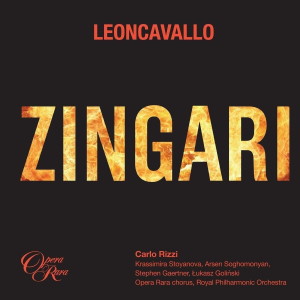
Ruggero Leoncavallo (1857-1919)
Zingari, dramma lirico in two episodes
(Reconstructed original 1912 version)
Fleana – Krassimira Stoyanova (soprano)
Radu – Arsen Soghomonyan (tenor)
Tamar – Stephen Gaertner (baritone)
Old man – Łukasz Goliński (bass-baritone)
Opera Rara Chorus
Royal Philharmonic Orchestra/Carlo Rizzi
rec. 2021, Fairfield Concert Hall, London
Italian libretto with English translation; notes in English; synopses in English, French, German & Italian
OPERA RARA ORC61 [64]
Leoncavallo’s eighth opera Zingari came to life because of a commission he received from London’s Hippodrome Theatre. Not long before, the circus style venue had remodeled itself to house more traditional theatrical and musical entertainments, and the proprietors asked Leoncavallo to come up with a repeat of his first success, Pagliacci. Leoncavallo had been contracted to conduct a series of performances at the Hippodrome in 1911, that were very popular with the public. Therefore, the commission of a new work, to be conducted by the composer, seemed like a good way to repeat the success of the previous year. In the event, the opera was very well received in its first run, and performances around the world followed, but it wasn’t long before the opera disappeared from the repertory. In his review of this release, my colleague Michael Cookson detailed the history of revisions that were made to the score by other hands after the initial production. Opera Rara have been most diligent in attempting to assemble a performing version of the opera that restores the original 1912 score as completed by the composer.
The opera begins fairly unpromisingly with another depiction of a Gypsy anvil chorus. One immediately wonders if there is really no other way to convey the unique local colour of a thriving Roma community. Gradually Leoncavallo’s chorus leads a strikingly beautiful middle section which is evocative of the setting sun. Now this is something worth hearing. This alternation in quality seems to set the pattern for the rest of the brief opera; it runs a good ten minutes shorter than Pagliacci. Leoncavallo’s musical inspiration tends to be fairly diffuse, with many patches of banal music alternating with more inspired sections. The more interesting sections generally fall into the category of scene painting music; the glowing music of the wedding sequence is the best example of this. The music creates mood and atmosphere of the finest sort. My impression is that Leoncavallo appears to have been inspired by Borodin’s atmospheric music for the Polovtsian camp from Act Two of Prince Igor. Certainly one can draw a link between these two works. There is also the distinct possibility that the success of Franz Lehar’s 1910 operetta Zigeunerliebe also exerted an even more direct influence on the composer.
The producers have brought an admirable team of performers to make as good a case as possible for the work. Krassimira Stoyanova’s gutsy throbbing soprano makes a powerful heroine, Fidelia. She gives her all in a passionately committed performance. If her highest register is no longer as firm as it once was, it is of little matter to experience such a gifted artist. My colleague, Ralph Moore was fairly dismissive of Arsen Soghomonyan’s Radu. I find that his bright, thrusting tenor is a good match for this typically lung-busting, verismo role. Radu is given a fairly punishing vocal line that Soghomonyan copes very well with. While he may never achieve the hype of a Franco Corelli, he has the good taste to not indulge in the vocal mannerisms that artists like Corelli and Richard Tucker often did. Both Stoyanova and Soghomonyan make a meal out of the relatively fine duet Leoncavallo gave them. Don’t expect anything quite as lovely as the duet for Nedda and Sylvio in Pagliacci; the composer doesn’t quite match that level of inspiration here. Stephen Gaertner is a powerful presence as the betrayed Tamar. This character is less the villain and more the wronged lover. Gaertner gets to strut his stuff in a very fine aria near the beginning of the opera and keeps up the tension whenever he appears.
The recording team have provided a good, reliable sound that leans more to the analytical than the spacious. Carlo Rizzi’s fine work with the orchestra and the excellent chorus is highlighted by this type of recording balance. Mr Rizzi seems to be currently much in the spotlight, as he has shown up in various media formats that have been brought to my attention. I have found him to be quite a dynamic conductor, particularly so in the recent transmission of Cherubini’s Medea from the Metropolitan Opera.
Overall my impression is that this was a respectable effort on the part of Opera Rara and it will serve quite well for listeners who want to investigate Leoncavallo’s other operas. That is providing that they aren’t expecting to encounter the same level of melodic and dramatic excitement to be found in Pagliacci.
Mike Parr
Previous reviews: Ralph Moore ~ Michael Cookson
Help us financially by purchasing through




















